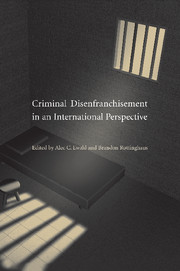Book contents
- Frontmatter
- Contents
- Contributors
- Foreword: Waves of Democracy and Criminal Disenfranchisement
- Acknowledgments
- Introduction
- Part I CONTEMPORARY DISENFRANCHISEMENT LAW
- Part II DISENFRANCHISEMENT IN COMPARATIVE PERSPECTIVE: LEGAL AND POLITICAL APPROACHES
- Part III VOTING RIGHTS AND PEOPLE WITH CRIMINAL CONVICTIONS: CASE STUDIES
- 6 The Politics and Legality of Prisoner Disenfranchisement in Australian Federal Elections
- 7 The Campaign for Prisoner Voting Rights in Ireland
- 8 The Ballot as a Bulwark: Prisoners' Right to Vote in South Africa
- 9 The Right to Vote in Danish Prisons
- 10 In Defense of Prisoner Disenfranchisement
- Index
- References
8 - The Ballot as a Bulwark: Prisoners' Right to Vote in South Africa
Published online by Cambridge University Press: 03 July 2009
- Frontmatter
- Contents
- Contributors
- Foreword: Waves of Democracy and Criminal Disenfranchisement
- Acknowledgments
- Introduction
- Part I CONTEMPORARY DISENFRANCHISEMENT LAW
- Part II DISENFRANCHISEMENT IN COMPARATIVE PERSPECTIVE: LEGAL AND POLITICAL APPROACHES
- Part III VOTING RIGHTS AND PEOPLE WITH CRIMINAL CONVICTIONS: CASE STUDIES
- 6 The Politics and Legality of Prisoner Disenfranchisement in Australian Federal Elections
- 7 The Campaign for Prisoner Voting Rights in Ireland
- 8 The Ballot as a Bulwark: Prisoners' Right to Vote in South Africa
- 9 The Right to Vote in Danish Prisons
- 10 In Defense of Prisoner Disenfranchisement
- Index
- References
Summary
INTRODUCTION
The political and social transformation of South Africa started in 1990 with a sense of trepidation but with a general conviction that there was no other way but transition to a constitutional democracy, and the nation held its first democratic elections in 1994. Even South Africans in prison have been part of the achievement of a relatively peaceful transition: South Africa is one of a select group of countries in the world where both sentenced and unsentenced prisoners vote in elections. However, prisoners' participation in the 1994 elections as well as in subsequent elections has not been uncontested, and as this chapter shows, that participation has been and remains the subject of intense constitutional and political scrutiny. That South African prisoners can now vote should not be regarded as the end of the story because history has shown that prisoners' rights are very much a function of broader sociopolitical trends. The current government is faced with a persistent violent crime problem that is leaving the South African population frustrated, victimized, and traumatized. The euphoria of the 1994 transition to democracy is a distant memory for many South Africans, and prisoners' rights are finding fewer sympathetic ears. Moreover, both of the landmark Constitutional Court decisions protecting prisoners' right to vote may be read more narrowly than they are sometimes perceived outside South Africa.
- Type
- Chapter
- Information
- Criminal Disenfranchisement in an International Perspective , pp. 221 - 243Publisher: Cambridge University PressPrint publication year: 2009

